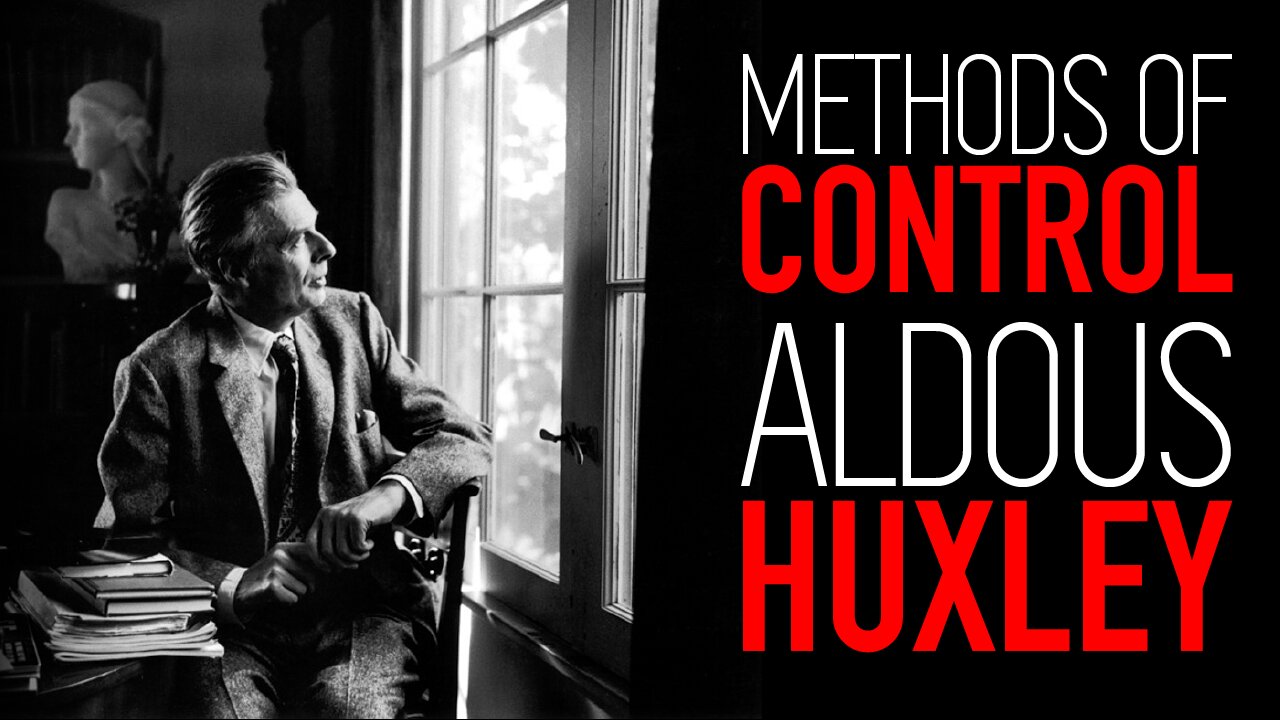Premium Only Content

METHODS OF CONTROL | ALDOUS HUXLEY - 1962
Aldous Huxley speech: 'The Ultimate Revolution' - Berkeley Language Center - March 20, 1962
"If you are going to control any population for any length of time, you must have some measure of consent, it’s exceedingly difficult to see how pure terrorism can function indefinitely. It can function for a fairly long time, but I think sooner or later you have to bring in an element of persuasion an element of getting people to consent to what is happening to them.
It seems to me that the nature of the ultimate revolution with which we are now faced is precisely this: That we are in process of developing a whole series of techniques which will enable the controlling oligarchy who have always existed and presumably will always exist to get people to love their servitude. This is the, it seems to me, the ultimate in malevolent revolutions shall we say, and this is a problem which has interested me many years and about which I wrote thirty years ago, a fable, Brave New World, which is an account of society making use of all the devices available and some of the devices which I imagined to be possible making use of them in order to, first of all, to standardize the population, to iron out inconvenient human differences, to create, to say, mass produced models of human beings arranged in some sort of scientific caste system. Since then, I have continued to be extremely interested in this problem and I have noticed with increasing dismay a number of the predictions which were purely fantastic when I made them thirty years ago have come true or seem in process of coming true.
A number of techniques about which I talked seem to be here already. And there seems to be a general movement in the direction of this kind of ultimate revolution, a method of control by which a people can be made to enjoy a state of affairs by which any decent standard they ought not to enjoy. This, the enjoyment of servitude, Well this process is, as I say, has gone on for over the years, and I have become more and more interested in what is happening.
And here I would like briefly to compare the parable of Brave New World with another parable which was put forth more recently in George Orwell’s book, Nineteen Eighty Four. Orwell wrote his book between, I think between 45 and 48 at the time when the Stalinist terror regime was still in full swing and just after the collapse of the Hitlerian terror regime. And his book which I admire greatly, it’s a book of very great talent and extraordinary ingenuity, shows, so to say, a projection into the future of the immediate past, of what for him was the immediate past, and the immediate present, it was a projection into the future of a society where control was exercised wholly by terrorism and violent attacks upon the mind-body of individuals.
Whereas my own book which was written in 1932 when there was only a mild dictatorship in the form of Mussolini in existence, was not overshadowed by the idea of terrorism, and I was therefore free in a way in which Orwell was not free, to think about these other methods of control, these non-violent methods and my, I’m inclined to think that the scientific dictatorships of the future, and I think there are going to be scientific dictatorships in many parts of the world, will be probably a good deal nearer to the brave new world pattern than to the 1984 pattern, they will a good deal nearer not because of any humanitarian qualms of the scientific dictators but simply because the Brave New World pattern is probably a good deal more efficient than the other.
That if you can get people to consent to the state of affairs in which they’re living. The state of servitude the state of being, having their differences ironed out, and being made amenable to mass production methods on the social level, if you can do this, then you have, you are likely, to have a much more stable and lasting society. Much more easily controllable society than you would if you were relying wholly on clubs and firing squads and concentration camps. So that my own feeling is that the 1984 picture was tinged of course by the immediate past and present in which Orwell was living, but the past and present of those years does not reflect, I feel, the likely trend of what is going to happen, needless to say we shall never get rid of terrorism, it will always find its way to the surface.
But I think that insofar as dictators become more and more scientific, more and more concerned with the technically perfect, perfectly running society, they will be more and more interested in the kind of techniques which I imagined and described from existing realities in Brave New World. So that, it seems to me then, that this ultimate revolution is not really very far away, that we, already a number of techniques for bringing about this kind of control are here, and it remains to be seen when and where and by whom they will first be applied in any large scale.
And it is of course true that pharmacologists are producing a great many new wonder drugs where the cure is almost worse than the disease. Every year the new edition of medical textbooks contains a longer and longer chapter of what are Iatrogenic diseases, that is to say diseases caused by doctors (laughter} And this is quite true, many of the wonder drugs are extremely dangerous. I mean they can produce extraordinary effects, and in critical conditions they should certainly be used, but they should be used with the utmost caution. But there is evidently a whole class of drugs effecting the CNS which can produce enormous changes in sedation in euphoria in energizing the whole mental process without doing any perceptible harm to the human body, and this presents to me the most extraordinary revolution. In the hands of a dictator these substances in one kind or the other could be used with, first of all, complete harmlessness, and the result would be, you can imagine a euphoric that would make people thoroughly happy even in the most abominable circumstances.
I mean these things are possible. This is the extraordinary thing, I mean after all this is even true with the crude old drugs. I mean, a housemate years ago remarked after reading Milton’s Paradise Lost, He says “And beer does more than Milton can to justify God’s ways to man” (laughter). And beer is of course, an extremely crude drug compared to these ones. And you can certainly say that some of the psychic energizers and the new hallucinants could do incomparably more than Milton and all the Theologians combined could possibly do to make the terrifying mystery of our existence seem more tolerable than it does. And here I think one has an enormous area in which the ultimate revolution could function very well indeed, an area in which a great deal of control could be used by not through terror, but by making life seem much more enjoyable than it normally does. Enjoyable to the point, where as I said before, Human beings come to love a state of things by which any reasonable and decent human standard they ought not to love and this I think is perfectly possible.
But then, very briefly, let me speak about one of the more recent developments in the sphere of neurology, about the implantation of electrodes in the brain. This of course has been done in the large scale in animals and in a few cases its been done in the cases of the hopelessly insane. And anybody who has watched the behavior of rats with electrodes placed in different centers must come away from this experience with the most extraordinary doubts about what on Earth is in store for us if this is got a hold of by a dictator. I saw not long ago some rats in the {garbled} laboratory at UCLA there were two sets of them, one with electrodes planted in the pleasure center, and the technique was they had a bar which they pressed which turned on a very small current for a short space of time which we had a wire connected with that electrode and which stimulated the pleasure center and was evidently absolutely ecstatic was these rats were pressing the bar 18,000 times a day (laughter). Apparently if you kept them from pressing the bar for a day, they’d press it 36,000 times on the following day and would until they fell down in complete exhaustion (laughter) And they would neither eat, nor be interested in the opposite sex but would just go on pressing this bar {pounds on podium}
Then the most extraordinary rats were those where the electrode was planted halfway between the pleasure and the pain center. The result was a kind of mixture of the most wonderful ecstasy and like being on the rack at the same time. And you would see the rats sort of looking at is bar and sort of saying “To be or not to be that is the question”. (Laughter) Finally it would approach {Pounds on podium} and go back with this awful I mean, the (sounds like franken huminizer anthropomorphizer), and he would wait some time before pressing the bar again, yet he would always press it again. This was the extraordinary thing.
I noticed in the most recent issue of Scientific American there’s a very interesting article on electrodes in the brains of chickens, where the technique is very ingenious, where you sink into their brains a little socket with a screw on it and the electrode can then be screwed deeper and deeper into the brain stem and you can test at any moment according to the depth, which goes at fractions of the mm, what you’re stimulating and these creatures are not merely stimulated by wire, they’re fitted with a miniature radio receiver which weighs less than an ounce which is attached to them so that they can be communicated with at a distance, I mean they can run about in the barnyard and you could press a button and this particular area of the brain to which the electrode has been screwed down to would be stimulated. You would get this fantastic phenomena, where a sleeping chicken would jump up and run about, or an active chicken would suddenly sit down and go to sleep, or a hen would sit down and act like she’s hatching out an egg, or a fighting rooster would go into depression.
The whole picture of the absolute control of the drives is terrifying, and in the few cases in which this has been done with very sick human beings, The effects are evidently very remarkable too, I was talking last summer in England to Grey Walter, who is the most eminent exponent of the ECT technique in England, and he was telling me that he’s seen hopeless inmates at asylums with these things in their heads, and these people were suffering from uncontrollable depression, and they had these electrodes inserted into the pleasure center in their brain, however when they felt too bad, they just pressed a button on the battery in their pocket and he said the results were fantastic, the mouth pointing down would suddenly turn up and they’d feel very cheerful and happy. So there again one sees the most extraordinary revolutionary techniques, which are now available to us.
Now, I think what is obviously perfectly clear is that for the present these techniques are not being used except in an experimental way, but I think it is important for us to realize what is happening to make ourselves acquainted with what has already happened, and then use a certain amount of imagination to extrapolate into the future the sort of things that might happen. What might happen if these fantastically powerful techniques were used by unscrupulous people in authority, what on Earth would happen, what sort of society would we get?
And I think it is peculiarly important because as one sees when looking back over history we have allowed in the past all those advances in technology which has profoundly changed our social and individual life to take us by surprise, I mean it seems to me that it was during the late 18 century early 19th century when the new machines were making possible the factory situation. It was not beyond the wit of man to see what was happening and project into the future and maybe forestall the really dreadful consequences which plagued England and most of western Europe and this country for sixty or seventy years, and the horrible abuses of the factory system and if a certain amount of forethought had been devoted to the problem at that time and if people had first of all found out what was happening and then used their imagination to see what might happen, and then had gone on to work out the means by which the worst applications of the techniques would not take place, well then I think western humanity might have been spared about three generations of utter misery which had been imposed on the poor at that time.
And the same way with various technological advances now, I mean we need to think about the problems with automation and more profoundly the problems, which may arise with these new techniques, which may contribute to this ultimate revolution. Our business is to be aware of what is happening, and then to use our imagination to see what might happen, how this might be abused, and then if possible to see that the enormous powers which we now possess thanks to these scientific and technological advances to be used for the benefit of human beings and not for their degradation."
-
 51:09
51:09
Candace Show Podcast
1 hour agoHILARIOUS! TikTok Ban Backfires | Candace Ep 133
14.7K36 -
 LIVE
LIVE
Dr Disrespect
6 hours ago🔴LIVE - DR DISRESPECT - WARZONE - NO MERCY
3,800 watching -
 5:32
5:32
Rethinking the Dollar
5 hours agoHolding 0.001 Bitcoin Could Make You a Millionaire – Here’s Why You’re the Elite
2602 -
 14:23
14:23
Degenerate Jay
6 hours ago $0.01 earnedThe Arkham Batman Is Alive - The Suicide Squad Game Is Dead
159 -
 1:06:50
1:06:50
PMG
19 hours ago $0.07 earned"Never trust a government that leads you into the apocalypse"
5621 -
 1:05:15
1:05:15
In The Litter Box w/ Jewels & Catturd
22 hours agoExternal Revenue Service | In the Litter Box w/ Jewels & Catturd – Ep. 720 – 1/15/2025
31.1K10 -
 5:55:09
5:55:09
Benny Johnson
8 hours ago🚨Confirmation Hearings LIVE Right NOW | Pam Bondi, Rubio, John Ratcliffe & More| Deep State PANIC
180K291 -
 6:04:07
6:04:07
Barry Cunningham
22 hours agoWATCH LIVE: Pam Bondi Attorney General Confirmation Hearing For w/ Nancy Mace Interview
33.1K18 -
 6:15:44
6:15:44
Robert Gouveia
11 hours agoPam Bondi Confirmation Hearing LIVE! Trump's Nominee to FIX Corrupt DOJ as Attorney General
43.8K21 -
 1:57:41
1:57:41
The Quartering
5 hours agoTrump Just FREED Hostages, Pam Bondi Hearing, TikTok To SHUTDOWN, Bill Burr Gets Woke, LA Fires
49.7K43